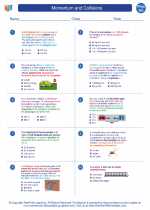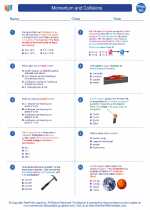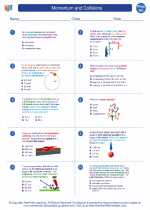Momentum and Collisions -> conflict resolution
Conflict Resolution
Conflict resolution is the process of addressing and resolving differences between individuals or groups. It involves using strategies to find a peaceful solution to disagreements, disputes, or conflicts. In any environment, be it school, workplace, or community, conflict resolution skills are essential for maintaining healthy relationships and promoting a positive atmosphere.
Types of Conflict
There are several types of conflicts, including:
- Interpersonal Conflict: This occurs between individuals and can arise from differences in personality, values, or beliefs.
- Intergroup Conflict: This involves conflicts between different groups, such as teams, departments, or communities.
- Intrapersonal Conflict: This is an internal conflict that an individual experiences within themselves, often involving conflicting emotions or desires.
Steps in Conflict Resolution
Effective conflict resolution involves a series of steps to address and resolve the conflict:
- Identify the Conflict: Recognize that a conflict exists and understand its nature and causes.
- Listen Actively: Listen to the concerns and perspectives of all parties involved in the conflict.
- Express Your Own Perspective: Clearly communicate your own thoughts and feelings about the conflict.
- Seek Common Ground: Look for areas of agreement and shared interests to build upon.
- Explore Solutions: Brainstorm possible solutions and evaluate the pros and cons of each.
- Choose a Solution: Select the best solution that addresses the concerns of all parties to the greatest extent.
- Implement the Solution: Put the chosen solution into action and monitor its effectiveness.
- Follow Up: Assess the outcome of the conflict resolution and make any necessary adjustments.
Skills for Conflict Resolution
Developing certain skills can greatly enhance the ability to resolve conflicts effectively:
- Communication: The ability to express oneself clearly and listen actively to others.
- Empathy: Understanding and appreciating the feelings and perspectives of others.
- Problem-Solving: Analytical and creative thinking to find constructive solutions.
- Negotiation: Seeking mutually beneficial agreements while managing differences.
- Emotional Intelligence: Recognizing and managing emotions in oneself and others.
Benefits of Conflict Resolution
Successfully resolving conflicts can lead to numerous positive outcomes, including:
- Improved relationships and teamwork
- Enhanced communication and understanding
- Increased trust and respect among individuals or groups
- Reduced stress and tension in the environment
- Opportunities for personal and professional growth
By developing and practicing conflict resolution skills, individuals can contribute to a more harmonious and productive social and work environments.
[Conflict Resolution] Related Worksheets and Study Guides:
.◂Physics Worksheets and Study Guides High School. Momentum and Collisions

 Worksheet/Answer key
Worksheet/Answer key
 Worksheet/Answer key
Worksheet/Answer key
